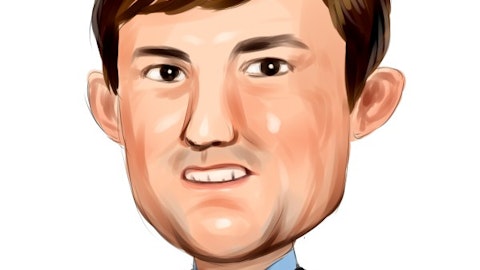
There was an academic article published recently on the investing of Warren Buffett. Afterward, I thought I saw a few articles reflecting on it, but here is the only one I see now: There’s Warren Buffett — and then there’s the rest of us. Buffett is different because he grew as an investor and as a businessman, and usually made the right moves over a 50+ year career. When you don’t have a lot of assets, and few people are doing value investing, you can do amazing things with special situations, and being an activist investor. In 1967, Buffett had control of a textile company named Berkshire Hathaway (BRK.A), when he used the resources of the company to purchase some smallish P&C insurance companies, National Indemnity and National Fire and Marine Insurance.
P/E ratio- what you need to know (DailyMirror)
The price-earnings ratio (P/E) is hands down the most popular ratio among investors. Value investors have long considered the price-earnings ratio a useful metric for evaluating the relative attractiveness of a company’s stock price. Made popular by the late Benjamin Graham, who was dubbed the ‘father of value investing’ as well as Warren Buffett’s mentor, Graham preached the virtues of this financial ratio as one of the quickest and easiest ways to determine if a stock is trading on an investment or speculative basis. When it comes to valuing stocks, the price/earnings ratio is one of the oldest and most frequently used metrics.
Romney makes presidential choice easy (WatertownDailyTimes)
Has choosing the president ever been this easy? Do we want for our president a multimillionaire who is busy investing his wealth oversees and hides the profits in offshore bank accounts in Switzerland, Bermuda and the Cayman Islands? Mitt Romney thinks that all this is OK because it is legal. It might be within the law, but is sure doesn’t pass the smell test. Do we want a president who paid only 13.9 percent income tax in 2010 and thinks that is fair? What a difference between Mr. Romney and billionaire Warren Buffett, who is embarrassed for paying only 15 percent and wants it raised.
How to profit from the post-Olympic spirit (MarketWatch)
With an incredible four billion people tuning in to the London Olympics, watching athletes swim, run, dive, jump and hurdle their way to greatness, London Olympic sponsors will be hoping viewers are inspired to replace their armchairs with exercise bikes. …Few would probably realize that with every tip-off in an NBA basketball game, Warren Buffett’s Berkshire Hathaway BRK.A +0.33% BRK.B +0.28% makes money. That’s because the official Spalding basketball is owned by Russell Brands, a wholly owned subsidiary of Berkshire since 2006.
Oregon’s grade in finance: a solid C (Examiner)
In a recent rating of all 50 states by Barron’s magazine, Oregon ranks 25th. If you’re happy with a C from those who manage your money, then feel free to pat your state legislators and executives on the back. Otherwise, read on. The good news is that Oregon began to address state worker pension promises in 1996. No longer do we guarantee an 8% annual return on all invested pension funds. Even famed investor Warren Buffett projects less, 7.1%. That may not sound like much of a difference, but for one retiree earning a $50,000 annual pension from age 60 to age 90, it represents added state debt of $50,000, and there are over 32,000 state workers.
Billionaire Mandel is bullish on three stocks (MarketWatch)
Two of the most successful Tiger Cubs are Andreas Halvorsen of Viking Global and Stephen Mandel of Lone Pine Capital. Viking Global, between 2005 and 2010, returned a remarkable 119%; Lone Pine manages about $17 billion, and Mandel has become a billionaire based on the strength of his investment prowess ( read more about Mandel and Halvorsen). …Warren Buffett’s Berkshire has a position in Visa as well but it was reduced by 27% over the second quarter (see Warren Buffett’s new bullish bets ).
Poor little rich kids: world’s wealthiest lose billions on stocks (Albawaba)
The 40 richest people on the planet lost a combined $3.7 billion this week as global stocks declined. The biggest loser was Carlos Slim, who dropped $1.7 billion. Shares of the telecommunications mogul’s Mexico City-based America Movil fell 2.2 per cent during the week. …Ortega has been jostling with Berkshire Hathaway chairman Warren Buffett for the title of world’s third-richest man. Ortega bumped Buffett, 81, from the No. 3 spot on the index on August 6, after shares of Inditex surged. Buffett, who is worth $45.8 billion, reclaimed the position August 10.
Why Total Looks Cheap (SeekingAlpha)
Investors know that to generate alpha one must constantly seek out new opportunities and new ways of looking at the same things. Alpha can be created by capitalizing on public information that other investors can’t easily process (think footnotes of a 10-k), building a better mousetrap (think a better valuation model), achieving a better understanding of how the market works (an in-depth understanding of the company and its drivers), or exploiting structural impediments of the market (think cross-methodological work and post-earnings drift). …We think earnings and free cash flow drive the valuations of stocks, and we use a tried-and-true margin of safety concept to determine which firms are undervalued. We embrace Warren Buffett and Benjamin Graham. Our technical and momentum process is also very simple and straightforward-we’re not reading the stars with our technical/momentum process for our next great alpha-generator.





